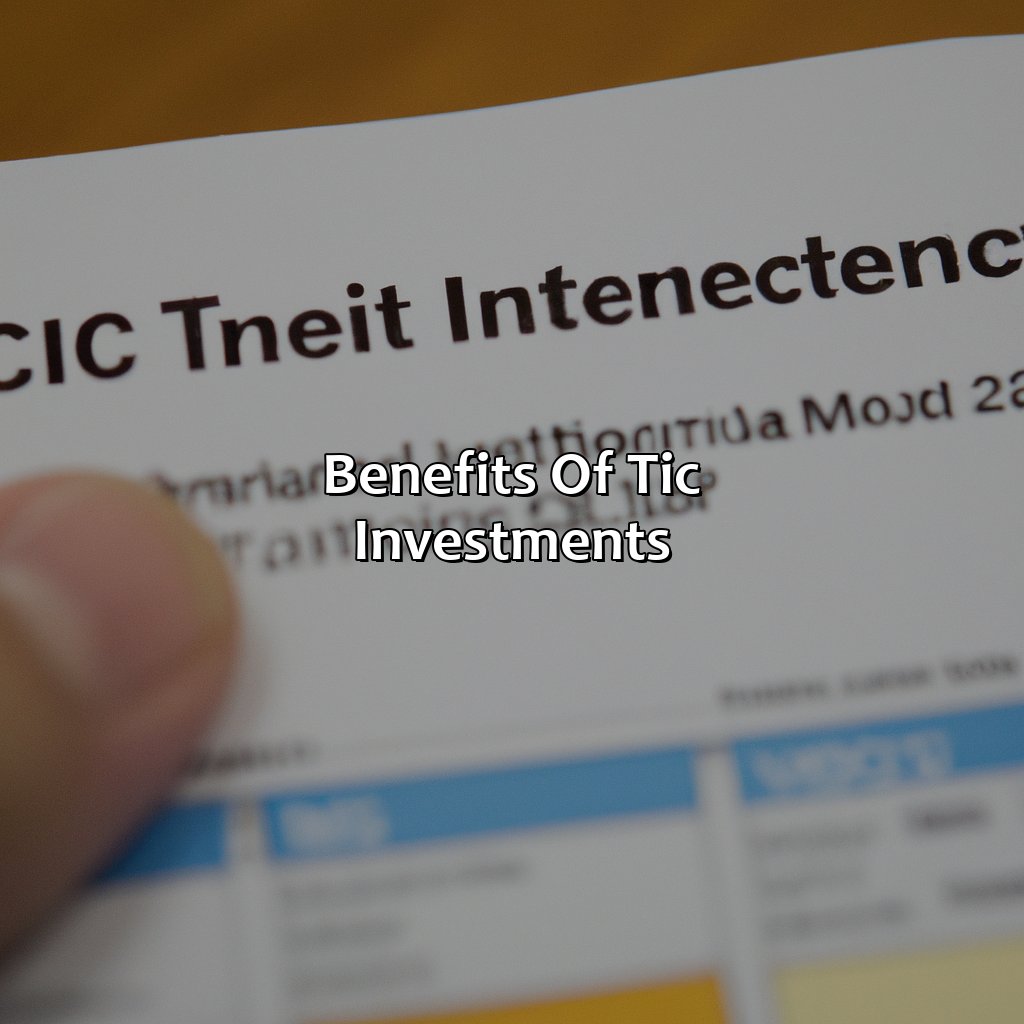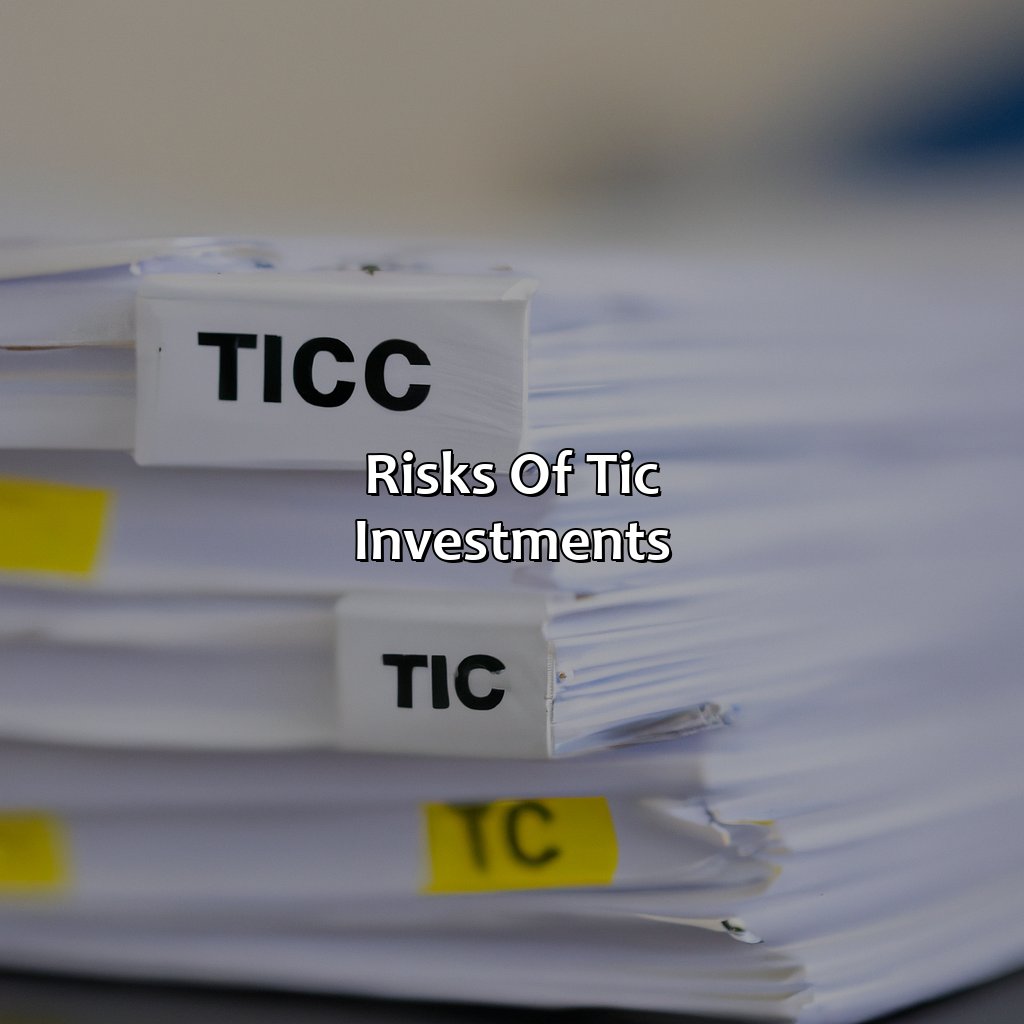What Is A Tic Investment?
Key Takeaway:
- TIC investments are an ownership model where multiple investors come together to purchase a property, allowing for access to larger and potentially more profitable real estate deals.
- Compared to traditional investment vehicles, TIC investments provide greater diversification and passive income generation, as well as reduced risk and liability for investors.
- However, TIC investments also come with risks such as lack of liquidity, restrictions on sale, and dependence on co-owners. It is important to conduct thorough due diligence and evaluate TIC sponsors before investing.
Are you looking for an investment that offers low risks and spending flexiblity? TIC investments may be the right solution for you! This article discusses the various benefits and risks associated with these investments, so you can make an informed decision.
What are TIC investments?
TIC investments refer to tenants-in-common investments where multiple owners jointly invest and co-own a property. TIC investments allow diversification across different properties, asset classes, and geographic regions. Investors can also purchase a fractional interest in a property, which reduces the investment size and allows passive income and potential appreciation. Additionally, TIC investments offer greater flexibility in cash flow management and exit strategies, unlike traditional real estate investments. A useful tip is to analyze the sponsor’s track record, the property performance, and management before investing in TICs.

Image credits: retiregenz.com by David Duncun
TIC Investments vs Traditional Investment Vehicles
Investors often compare TIC investments with traditional investment vehicles to decide which one suits their financial plan. The comparison can be made based on factors such as the investment amount, risk involved, potential returns, and liquidity. Here is a detailed comparison between TIC investments and traditional investment vehicles.
| TIC Investments | Traditional Investment Vehicles | |
|---|---|---|
| Investment Amount | Generally high, with a minimum of $100,000 | Varies depending on the type of investment vehicle |
| Risk | High, as TIC investments typically involve investing in real estate properties or businesses | Varies depending on the type of investment vehicle and the market conditions |
| Potential Returns | High, as investors receive a share of the profits in proportion to their investment | Varies depending on the type of investment vehicle and the market conditions |
| Liquidity | Low, as TIC investments are generally illiquid and can’t be sold easily | Varies depending on the type of investment vehicle |
Moreover, TIC investments offer investors the opportunity to own a portion of a valuable asset that could otherwise be beyond their reach. On the other hand, traditional investment vehicles such as stocks and bonds offer greater liquidity and diversification options.
In the early 2000s, TIC investments gained popularity due to their tax benefits and steady income stream. However, the financial crisis of 2008 led to a decline in the TIC investment market. Today, TIC investments continue to be an option for investors looking for alternative investment opportunities.

Image credits: retiregenz.com by Joel Washington
Benefits of TIC Investments
Gain the advantages of TIC investments! Diversify, generate passive income and reduce risks and liabilities. Explore the sub-sections of diversification, passive income generation and reduced risk and liability. Understand the benefits of TIC investments comprehensively.

Image credits: retiregenz.com by Yuval Duncun
Diversification
Having a broad range of investments, also known as portfolio diversification, is crucial to reducing risk. In the context of TIC investments, diversification means spreading your investment across multiple properties with varying characteristics, such as geography or asset class. By doing so, you reduce your exposure to any one property and thus decrease the volatility of your returns.
A diversified TIC investment portfolio can provide several benefits beyond reduced risk. For example, it can offer increased access to different markets and geographies that may not be readily available with traditional real estate investment offerings. Additionally, investors gain access to unique assets such as healthcare facilities or data centers that may have significantly different risk profiles than other types of real estate. Moreover, investing in multiple properties allows for more significant economies of scale with regards to management fees and operational expenses.
Pro Tip: Consider hiring a professional advisor who specializes in TIC investments to help select the right properties for diversification in your portfolio.
Passive income may sound like a lazy person’s dream, but with TIC investments, even the laziest can make a buck while lying on the couch.
Passive Income Generation
Passive Earnings via TIC Investments can be a stable revenue stream that needs no active exertion. It associates with the investor’s membership in the property deed and operates under IRS rules. These investments allow small-scale investors to access prime commercial estate, traditionally unavailable to them.
TIC Investments are an excellent option for:
- Those searching for regular rental income
- Wishing to own a fraction of lucrative properties but cannot manage it solely
- Seeking tax incentives on capital gains
These investments offer a long-term investment horizon, maintaining cash flow and appreciation potential.
TIC offers accessible alternatives for those who might not have funds or time for active management of real estate projects, primarily so with close family and colleagues.
According to Realized 1031 – a platform dedicated to researching passive investment strategies – they have observed growth in demand for TIC solutions among tenants-in-common advisors, which indicate investors’ preference. A rise in demand indicates investors are looking at TIC Investments as reliable passive means of gaining financial stability from diverse sources. Who needs a safety net when you’ve got TIC investments? Say goodbye to risky business and hello to reduced liability.
Reduced Risk and Liability
Investing in TICs offers a tremendous advantage of mitigating risk and reducing liability. As opposed to investing in sole proprietorship, the investment is shared between multiple individuals. Hence, in case of any legal or financial disputes, the liabilities are shared amongst the investors rather than being borne by a single individual.
This reduction in liability further provides peace of mind to investors as they can invest without having to worry about the consequences of any unforeseen events.
Another unique benefit of investing in TICs is that it bypasses the need for acquiring financing individually. With this collective approach, investors have greater buying power allowing access to properties that would otherwise be out of reach. This allows you to access high-end commercial real estate properties where one wouldn’t have been able to secure capital through conventional means.
Investing in TICs is a wise choice for anyone looking to diversify their investment portfolio while simultaneously managing risks. Do not lose out on this opportunity- Invest now!
When it comes to TIC investments, the risks are high and the returns can be as elusive as Bigfoot sightings.
Risks of TIC Investments
Grasp the hazards of TIC investments in detail. Look into the absence of liquidity, sale limitations, and reliance on co-owners. These elements can affect your investment experience. Think about them when making decisions. Examine the subsections to learn more about these dangers and how to reduce them.
The hazards of TIC investments can have a significant impact on your investment experience. It is important to understand the three main hazards:
- Absence of liquidity: TIC investments are generally considered illiquid investments, meaning that it may be difficult to sell your share of the property if you need to raise cash.
- Sale limitations: Even if you do find a buyer for your share of the property, there may be sale limitations in place. For example, the other co-owners may have a right of first refusal, meaning that they must be given the option to purchase your share of the property before you can sell it to an outside buyer.
- Reliance on co-owners: Because TIC investments involve shared ownership of a property, your investment experience may be affected by the decisions and actions of your co-owners. For example, if one of your co-owners defaults on their mortgage payment, this may impact your investment as well.
It is important to examine the subsections to learn more about these dangers and how to reduce them in order to make informed decisions about TIC investments.

Image credits: retiregenz.com by Adam Washington
Lack of Liquidity
Investors should be aware of the limitations regarding liquidity when investing in TICs. This means that there may not be many buyers or sellers in the market, making it difficult to sell or buy TICs quickly. TIC investments have illiquid characteristics, which is a risk factor that investors need to acknowledge before they decide to invest. Unlike other investments like stocks and bonds, TICs are not traded on any public exchanges. The value of the investment depends upon market demand. Therefore, investors might face difficulty selling their shares if there is limited interest.
TIC investments cannot be easily converted into cash because they do not trade on public markets and most generally come with a holding period requirement before resale. Additionally, there are usually restrictions on resale agreements associated with TIC interests.
A real estate investor purchased a 20-unit apartment complex using the tenant-in-common structure as an investment vehicle along with ten other partners and was faced unexpected liquidity challenges due to limited buyers in the market after the major pipe-burst destroyed one of the units causing foreclosure proceedings leading to protracted litigation.
Looks like investing in TICs comes with more restrictions than a teenager’s curfew.
Restrictions on Sale
One of the potential challenges of TIC investments is that there may be restrictions on their sale. This means that investors who wish to sell their ownership interest in a TIC property may be limited in their options. This can lead to difficulties for those looking to exit the investment, particularly if they need to access capital quickly.
These restrictions are often put in place by the TIC sponsor, and can include minimum holding periods, limits on transfers or sales, and requirements for unanimous consent from other investors before a sale can take place. Additionally, TIC investments are typically illiquid, meaning that there may not be a readily available market for buying and selling shares.
It’s important for investors considering a TIC investment to carefully review the terms of the investment contract and understand any restrictions that may be in place. It’s also helpful to have a contingency plan in case an unexpected need for liquidity arises.
Investors should work with experienced professionals in evaluating and structuring TIC investments. One real-life example of issues with restrictions on sale occurred when a group of TIC investors were unable to sell their shares due to contractual restrictions, causing significant financial hardship for them.
Sharing ownership with others is like being in a never-ending game of trust fall, except when you hit the ground, you lose all your money.
Dependence on Co-Owners
Investing in TICs requires dependence on co-owners, which can pose potential risks that investors should be aware of. Co-ownership issues such as competing investment goals and financial instability may delay decisions and compromise the property’s value.
Moreover, co-owners’ partnerships can experience conflicts and disagreements due to differences in interests or personalities. These conflicts can prevent necessary improvements and maintenance from being made in a timely manner, leading to a reduction in property value.
In addition to these risks, investors should also consider the fact that TIC investments typically involve buying fractional ownership with one or more individuals they may not know well. Therefore, it is essential to conduct due diligence before investing in any new partnership.
Given these concerns regarding dependence on co-owners, investors must weigh their options carefully when deciding whether or not to invest in TICs. While this type of investment can yield high returns, investors must ensure they are willing to take on the associated risks before making any commitments.
Ready to roll the dice on TICs? Here’s how to invest without losing your shirt.
How to Invest in TICs?
Investing in TICs? This guide can help! First, find TIC opportunities. Then, evaluate the sponsor. Lastly, do your due diligence. Scrutinize the potential investments and assess sponsors to make an informed decision. Invest wisely!

Image credits: retiregenz.com by Yuval Washington
Finding TIC Opportunities
To identify TIC investments, research real estate websites and communicate with reliable brokers. Querying investors who have invested in TICs is an effective strategy to gather insights on profitable properties and potential risks. Additionally, attending a TIC investment seminar can provide valuable knowledge on monitoring the property’s performance and mitigating potential risks.
Pro Tip: Research the chosen property’s location and financial status thoroughly before investing in TICs.
Don’t just swipe right on any TIC sponsor, make sure you do your due diligence before committing to a long-term relationship.
Evaluating TIC Sponsors
When selecting TIC investments, researching sponsors is crucial. Investigating the sponsor’s track record and investment strategy will provide insights into their competency and trustworthiness. Additionally, analyzing past investment performance metrics of their portfolio can help in decision-making.
Digging deeper, further exploring the sponsor’s history with investors is significant. Conducting background research on related legal disputes or criminal activity can help gauge their ethical standards.
It’s worth noting that real estate companies began using TIC structures as early as the 1970s to finance large commercial properties and spread the risks among multiple investors. This allowed savvy investors to access premium commercial properties typically only available to institutional buyers.
Before investing in TICs, do your due diligence like you would in a Tinder date – swipe right on a good prospect, but don’t forget to Google them first.
Due Diligence
Conducting a thorough investigation of potential TIC investments is important before making a decision. Due diligence involves evaluating the property’s location, financial documents, partnership agreement, and property management. You can also assess the reputation and expertise of the sponsor or general partner responsible for managing the investment.
It is crucial to examine all relevant information available, identify existing risks and challenges in the investment, and evaluate whether the potential returns justify your investment. By taking these steps, you can mitigate risks and confidently invest in TIC properties that align with your long-term goals. Remember that due diligence remains an ongoing process throughout your investment journey.
Pro Tip: Seek guidance from a professional expert to ensure you successfully navigate through the due diligence process.
Five Facts About Tic Investment:
- ✅ Tic investment is a form of real estate investment where multiple investors co-own a property. (Source: Investopedia)
- ✅ Tic investments are often used in commercial real estate transactions. (Source: The Balance)
- ✅ Tic investments allow for greater diversification and access to larger and more expensive properties. (Source: Millionacres)
- ✅ Each investor in a tic investment holds a percentage interest in the property and shares in the income and expenses. (Source: The Real Deal)
- ✅ Tic investments are subject to regulations and restrictions under the Securities Act of 1933. (Source: National Association of Realtors)
FAQs about What Is A Tic Investment?
What is a TIC investment?
A TIC investment (Tenants in Common) is a type of real estate investment where multiple investors own an undivided interest in a property. Each investor has the right to use and occupy the property, and shares in the income and expenses associated with it.
How is a TIC investment different from a traditional real estate investment?
In a traditional real estate investment, a single owner or group of owners own the entire property, whereas in a TIC investment, multiple investors share ownership. Additionally, TIC investments often involve commercial real estate properties, such as shopping centers or office buildings, rather than residential properties.
What are the benefits of a TIC investment?
One benefit of a TIC investment is that it allows investors to own a portion of a larger property, which can be more affordable than buying an entire property themselves. TICs also provide an opportunity for diversification in a real estate portfolio and allow for potential tax benefits.
What are some potential risks of a TIC investment?
TIC investments may involve higher fees and expenses than traditional real estate investments. Additionally, TIC investments may be less liquid and more difficult to sell, as there may be a limited pool of potential buyers. Furthermore, if the property does not perform as expected, investors may not receive the anticipated returns.
How are TIC investments typically structured?
TIC investments are typically structured as private placements, which means they are not traded on public markets. Instead, a sponsor or manager will manage the property and distributions to investors. Investors typically have limited control over the management of the property and rely on the sponsor to make decisions.
What should investors consider before investing in a TIC?
Investors should consider their overall investment goals, risk tolerance, and financial situation before investing in a TIC. It is important to research the property, sponsor, and management team, and to evaluate the potential risks and rewards of the investment. Additionally, investors should consult with a qualified financial advisor or tax professional before making any investment decisions.
